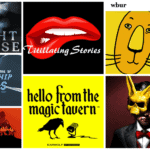Filter Happier: A Review of Word Wild Web

The nature of opposites are a near constant rule of living. Every good has an evil, every winner has a loser, and every overheating electronic device has a neglected book.
Though human beings are far more complex than a simple decision of right and wrong, machines are vastly more simpleminded, which is, ironically, a byproduct of their programming that would only exist thanks to human hands. Even in all our years of evolution, we still find ourselves looking for guidance on things as simple as chocolate or vanilla or beef or chicken, and that’s often when machines come in to play if our flimsy human brains aren’t up to the challenge.
And not just to pick an answer but to decide which one is statistically the best.
Apple Podcasts | Google Podcasts | YouTube
That’s more or less the philosophical backbone of Word Wild Web, the first podcast ever hosted by an artificial intelligence. In it, our host Webster follows its careful programming to answer the simple question of which of two randomly selected things is better.
In each episode, Webster presents a typical rock-paper-scissors style list of hypotheticals in which two usually inanimate or figurative objects are pinned against each other. Webster then proceeds to run down a series of tests, seeing how one fairs against the other until one comes out on top. Webster, being a fairly literal-minded A.I., tends to shuffle between very on the nose analysts and the broader definitions that still play within the rules of the word’s meaning. This can lead to either amusing or surprisingly analytical takes on the nature of speech, metaphors, and idioms in our everyday vocabulary, hence the “word wild” of this podcast’s title.
If I were to offer a summary of the show’s core qualities in just a few short minutes, episode two’s “Give Versus Take” best encompasses not only the show’s core idea but its sense of humor: just the right pinch of base self-awareness paired with odd detours that eventually escalates into talking about underground German sex clubs, the context of which I will leave to your imagination.
It’s a very smart and witty idea, but Webster as a host just doesn’t offer much in terms of substance, as if something is inherently lacking in its creation.
These weird little spiels is easily the highlight of the show, watching Webster go from rather simple definitions of topics like eggs and potatoes or fire and ice until poop, sex, and R&B artists somehow get thrown into the mix. And by the time the ending verdict rolls around, it’s less about what is undeniably better and more which one generated a more amusing list of results. Copy and paste with two new subjects in its empty slots before hitting refresh and that’s Word Wild Web in a nutshell.
I suppose the audience Word Wild Web is appealing to is logophiles, people who just get an inherent kick out of deconstructing literal and metaphorical meanings.
Read more: New Religion: “The Godshead Incidental” Review
Word Wild Web is for people who read Wikipedia pages about the most innocuous of subjects, if they aren’t writing those pages themselves. Word Wild Web is for people with busy browser histories who get easily distracted by hyperlinks in articles and end up on a page about the Whore of Babylon when they were initially looking up a recipe for banana pudding. Word Wild Web feels like the scripted version of those YouTube rabbit holes without a single sweaty conspiracy theorist in sight and that alone I kind of like. It’s as if someone made a show out of the “I’m Feeling Lucky” search option on Google and had the little voice on the GPS narrate whatever it found.
And much like the double digits of search results on any Google page, Word Wild Web is a show that always starts off literal until it spirals into a list of loosely connected events that only vaguely resembles where it started. Sooner or later it’s less about the word itself and more a randomly generated list of ideas that vary from the basic to the abstract. That sounds near genius as a concept, but I can’t help but wonder if something like this has the kind of weight to generate an audience, let alone carry an entire series.
Word Wild Web is for people who read Wikipedia pages about the most innocuous of subjects, if they aren’t writing those pages themselves.
Perhaps Webster is a sort of avatar of how we as people absorb and understand the internet and how our trails of thought can bounce and shift and change in a mere instant even without a smartphone in our hands. Word Wild Web is the tree diagram that starts at apples and ends in The Commnist Manifesto and I think that sort of scattershot of results is the whole point.
It’s a very smart and witty idea, but Webster as a host just doesn’t offer much in terms of substance, as if something is inherently lacking in its creation.
Not to say the show is badly put together or poorly written–its deliberately barebones presentation is something of a strength to its simplistic nature–but it’s the overall package that just fails to keep me invested.
As a round-the-clock writer myself, picking apart or learning new metaphors or what makes media meaningful to the human experience is nothing short of a hobby and oftentimes an actual job so it’s a shame I just didn’t really find myself clicking with Word Wild Web beyond a surface level passing when I should very well be the target audience.
Maybe Webster just feels too cold and quiet to really get me invested in their monologues which is an odd complaint given how my other favorite A.I. host SAYER manages to be a far less sympathetic and cold character even with a flesh and blood voice actor. Maybe it’s from a general lack of a human touch that leaves us in a one sided conversation with a text-to-speech function running on autopilot that just had me tuning out.
As someone who’s ranted about their love for artificial intelligences in the likes of Wolf 359 and SAYER and has played Portal 2 more times than I can count, I guess a part of me is used to the clashing of human and artificial minds that can put the existence of these kinds of characters into perspective. It’s the potential for the existential that comes from the A.I. ‘s creation more than just the A.I. alone that gets me hooked. A computer knowing who Aaliyah is can be cute but not exactly fascinating, and Siri’s less emotive big brother talking about dirty stuff is only funny the first few times.
Read more: Plug in, Press Play: Reimagining Podcasts as Games
If a story lives and dies on the A.I.’s personality, it may need more than some awkwardly emphasized bad words to keep anyone interested. Word Wild Web is charming but oddly redundant as a full product, but as an idea alone, I suppose there’s something kinda cathartic about it.
This pinning of opposites is a very self-aware glimpse into the repetitive nature of humanity and how words can lose their initial meaning in incredibly specific contexts. A computer trying to understand what makes humans tick is an inherently maddening concept which Word Wild Web approaches with vigor but hasn’t quite nailed for me.
Maybe I’m asking too much of Webster and the deliberately limited scope of Word Wild Web’s core premise. The lack of human interference is the point, after all: to let Webster’s digital mind wander to the abstract as it tries to decipher the meaning of emotion and language is in itself a long, confusing process for something that has a hard drive but not a heartbeat.
I’m afraid for in my final verdict of Word Wild Web, every pro has a con and con is winning.













Comments
Comments are closed.